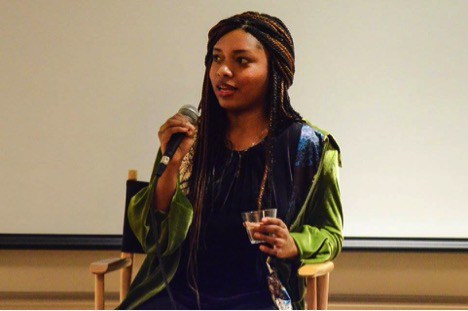Shereen Malherbe's Blog, page 25
May 21, 2016
A collection of interviews with Shereen Malherbe, author of Jasmine Falling
 “Jasmine Falling is the debut novel of British Palestinian writer (and MMW Contributor!) Shereen Malherbe. It is a tale of self-discovery and finding belonging, set mostly during ten action-charged days in Jerusalem, where Jasmine travels to find her missing father after her mother’s death. I spoke with Shereen about the inspiration for the novel, the work of writing it, and what advice she would give aspiring novelists.
“Jasmine Falling is the debut novel of British Palestinian writer (and MMW Contributor!) Shereen Malherbe. It is a tale of self-discovery and finding belonging, set mostly during ten action-charged days in Jerusalem, where Jasmine travels to find her missing father after her mother’s death. I spoke with Shereen about the inspiration for the novel, the work of writing it, and what advice she would give aspiring novelists.
How would you describe your novel Jasmine Falling ? Is it a mystery, a romance, a coming of age story, all of the above?
I would describe it as all of the above! The best advice I was given was to be a storyteller. My interpretation of this, was to include elements that make the journey memorable so by weaving in these genres it hopefully offers that to my readers.”
Read the full interview via Muslimah Media Watch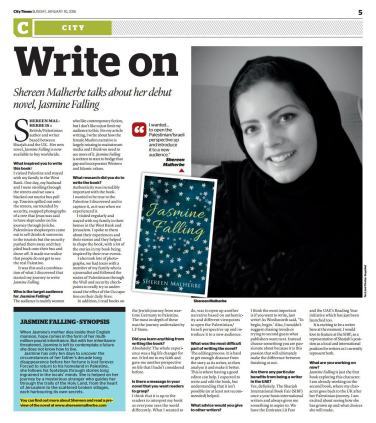
Interview in the City for Khaleej Times.
“What inspired you to write this book?
I visited Palestine and stayed with my family in the West Bank. One day, my husband and I were strolling through the streets and we saw a blacked out tourist bus pull up. Tourists spilled out onto the streets, surrounded by security, snapped photographs of a tree that Jesus was said to have slept under on his journey through Jericho. Palestinian shopkeepers came out to sell drinks & souvenirs to the tourists but the security pushed them away and they piled back onto their bus and drove off. It made me realise that people do not get to see the real Palestine.
It was this and a combination of what I discovered that started my journey to write Jasmine Falling.
What research did you do to write the book?
Authenticity was incredibly important with the book. I wanted to be true to the Palestine I discovered and to capture it, as it was when we experienced it.
I visited regularly and stayed with my family in their homes in the West Bank and Jerusalem. I spoke to them about their experiences and their stories and they helped to shape the book, with a lot of the stories in my book being inspired by their true events.
I also took lots of photographs, we had tours with a member of my family who is a journalist and followed the routes of Palestinians through the Wall and security checkpoints to really try to understand the effect of the Occupation on their daily lives.
In addition, I read books on the Jewish journey from wartime Germany to Palestine. The most in-depth of these was the journey undertaken by I.F Stone.”
Read the full interview with the U.A.E’s Khaleej Times here.

Interview with Hayati Magazine
PF: Congratulations on your novel, Jasmine Falling, being published! Masha’Allah. I have to say that at first, your main character came off as a Muslim person to me. So, some of her choices made me ponder for a moment because my subconscious played the haram police a bit. *Laughs.* Was your intention to put a little doubt in the mind of your readers so that they learn not to judge?
SM: Thank you. Alhamdulillah for the opportunity to write it. My intention with my novel was to show a journey with Jasmine. At first, she associates herself with her British heritage and she has never had the opportunity to learn about her faith. My novel is designed to introduce the beauty of Islam into modern literature from an outsider’s view so it was important that Muslims and non-Muslims can relate to the character. I believe that relatable fiction is more important than portraying characters who never do anything wrong because that isn’t real life. And I guess, if it teaches you not to be judgmental then that can only be positive! ”
Read the full interview via Hayati Magazine
To watch Shereen’s appearance on the BelAhdan Show discussing writing, Palestine and her novel click here.


Muslimah Media Watch Book Review: Jasmine Falling

Republished from Muslimah Media Watch:
Jasmine Falling by Muslimah Media Watch’s very own Shereen Malherbe recounts the story of Jasmine, a young English girl who, in order to receive her inheritance after her mother dies, searches for her father in his native Palestine and winds up discovering not only the family she left behind, but also the culture to which she belongs.
As clichéd as the phrase may be, reading Jasmine Falling sent me on an emotional rollercoaster. Within the span of just a few pages I would find myself vacillating between pitying Jasmine for her loss and being downright angry with a fictional character for the decisions she makes: for example, Jasmine’s decision to get drunk in Palestine (a foreign land for her) with a guy she hardly knows, even though going to the bar had nothing to do with her mission, upset me so much I briefly stopped reading, then realized I was angry out of concern. I know people who’ve done the same thing Jasmine did, and I know the unfortunate consequences of their actions. Despite my frustrations with some of the protagonist’s choices, by the end of the novel, I was overwhelmingly happy for Jasmine, because she “found what her heart wanted.”
When I took a step back from the book after reading it, I realized I got way more involved with the characters than I normally do. As I read, I quoted the book and narrated Jasmine’s life to those around me (mostly my mother, who eventually began asking me for updates in Jasmine’s life) which speaks volumes (pun intended) about how well-written the novel is. Though written in accessible prose, the sentences are woven in such a way that the reader feels almost part and parcel of the action, of which there is plenty. Jasmine Falling is almost overwhelming in its back-to-back twists and turns, but each new plot element follows naturally from the one that preceded it.
Religion plays a more central role in Jasmine Falling than the title would suggest. Malherbe’s novel is peppered with references to Islam, but the book doesn’t feel “Islamic,” nor do the references disrupt the flow of the story. In fact, the references propel the story as Jasmine goes down the path of growth and self-understanding. The adhan (call to prayer) in the countryside provides a cadence against which readers can measure the passage of the day. The Arabic greetings provide a layer of authenticity to the novel. Jasmine’s gradually increasing usage of phrases such as “alhamdulillah” and her slow recollection of Islamic teachings she learned as a child (and abandoned as a teenager) artfully indicate her growth of character.
Despite the elements of Islam in Jasmine Falling, there are several themes in the novel that may appeal to a non-Muslims just as much as Muslims. My mother, who is a sixty-year-old Christian, was just as eager to hear about Jasmine as I was to read about her. Jasmine appealed to my mother’s sense of adventure. Those with ties to Middle Eastern culture will enjoy that aspect of the novel. Third culture children (people who grew up in a culture different from that of their parents) and people whose parents are from two different places but they themselves only grew up in one would enjoy Jasmine Falling the most. Much of Jasmine’s internal conflict centers around cultural reconciliation. She grew up in England, and after her father disappeared, her mother essentially ignored Jasmine’s Palestinian half. Jasmine, who remembers her father, felt the emptiness, but decided to immerse herself in English culture. When she goes to Palestine, she is filled with a mix of nostalgia for the old sights and smells and regret at having let her roots slip away.
Reading this novel certainly made me realize how important it is to acknowledge and celebrate all of the cultures in which I was raised. I’m both more proud to be black and less hesitant to call myself American. Just as Jasmine realized the rejection of her father’s culture left her flailing for grounding, I have begun to realize that the food, the media, and the traditions I grew up with make me who I am. Trying to stifle the minority culture (black) to better conform to the majority culture (American) split my personality unnecessarily, and left me generally confused. My new-found embracement of my hyphenated identity is perhaps indicative of why I enjoyed it so much: Jasmine, in a way, is me.
Though Jasmine’s reason for going to Palestine was not a happy one, the novel is not very grim. There are dark moments, as there are in most novels, but Malherbe managed to strike a balance between the uplifting moments and the somber ones. Jasmine is a youthful, audacious character, almost to the point of recklessness at times. She follows her instincts and is not afraid to speak up when she witnesses injustice. It was refreshing to read something about a Muslim woman that didn’t paint her life as exceedingly difficult, and that didn’t involve her overcoming some form of culture-based oppression that she blamed on religion. Jasmine Falling will remain on my shelf for some time to come, and I hope to find more books worthy enough to join it.
Review by Sarabi Eventide for Muslimah Media Watch


The Permanent Traveller by Shereen Malherbe

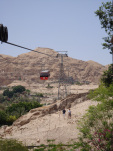
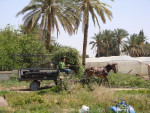
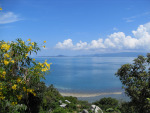
The Permanent Traveller.
‘Life is a journey’. How many times have I heard this during my young years? What I’ve come to believe and understand is that life is made not of one single journey but a series of journeys. Often we are searching for things from one point to the next. So here is a selection of my adventures to date that have brought me to this point as I write to you.
My journey into adulthood led me to search for security and success. What defined security more than working in a Bank? By 21 years old, in my new position as their youngest financial adviser, I felt I had made it. I was good at what I did and I had financial security. By 23, I was headhunted to work as part of the Bank’s future wealth strategy. It was from the thirtieth floor, through the tinted glass and the mist outside, that I watched over my City. Ferry taxis pulled workers across the water, dressed in the same colours as the greying winter skies. Days ticked by into scheduled hour time slots and meetings. The banking landscape shifted quickly in my glass tower. The people I had worked with for years; working overtime, studying, staying late, working conscientiously to better their lives, were made redundant in a matter of months. Their hopes and their ambitions left tattered in the shiny City that had taken the best of their time, then left them out to dry on the banks. My journey no longer felt successful and I felt disenchanted. I booked a one-way plane ticket to a place often termed the ‘travellers paradise’. I became a traveller in every sense of the word; jobless, home-less, with a backpack of belongings and my new husband by my side, we travelled East to search for what else the world could offer.
Gasoline from the scooter soaked into my sandals as it pulled us up hills and brick red soil roads cut through the rainforest, free falling down to the sea. A secluded cove with wooden shacks scattered by the tree line, and more up to the top of the rocks looking out over the calm open sea, promised us an escape. A green river ran down the back of the cove, home to monitor lizards the size of komodo dragons that lurked in the waters. We chose a hut perched on the rocks and slept with the door ajar to allow the fresh sea breeze to blow through it. Electricity was cut off every evening at dusk. The days and nights rolled into one another and passed in a heady mix of exploration and relaxation.
When the monsoon rains poured down from the sky, fist-sized raindrops hammered down onto the tin roof and reminded me of the magnitude of what lay beyond the clouds. The monsoon caused mudslides which blocked off the only road to the cove leaving us trapped in a small corner of the world. One night, the sea was eerily quiet and I could hear movements in the shadows. I couldn’t sleep, so I sat outside watching and waiting for the sun to rise. The night took forever to pass until finally the sun edged up. The sky was awash with gold and it brought respite from the darkness. ‘Alhamdulillah for the sunrise,’ I had remembered my Uncle saying in passing to me once. The phrase echoed in my mind and never seemed so poignant as it did in that moment.
In the daylight, travellers passed me by, searching for something none of us could name. I felt the same. The longer we were all there, the more likely it was that we would fall into escapism and intoxication; searching for a paradise we had been promised from the islands so far from home. Due to the malaria risk, we stayed coastal. Our trip around the islands was coming to an end but we weren’t ready for our travels to finish. So with my father visiting his family in Palestine, we flew to meet them.



Our next journey took us to my grandmother’s old farm house of four rooms filled with nothing but love and generosity. The simplicity and warmth was unlike anywhere we had ever experienced. The path that Jesus (AS) walked in Jericho was well trodden on the tourist trail. In Jerusalem, staring up at the Dome of the Rock, the story of Prophet Muhammed’s (SAW) night journey up to the heavens inscribed there, made his journey come alive.

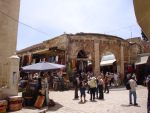
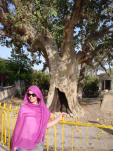
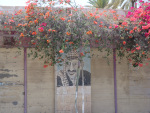
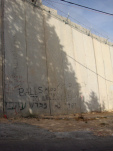
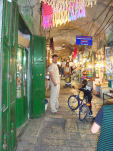
Being in the land of the Prophets journeys made me think about mine.
I began to learn about Islam. I felt compelled to learn more about it because of the strength it gave to those I had stayed with in Palestine. I read leaflets that introduced the scientific revelations of the Quran, the position and respect it gave to women and mothers. I became attracted to its moral code of forgiveness, kindness and compassion. I had studied Capitalism, Communism and other societal structures but they hadn’t provided the answers, nor could they. I asked why none of them worked, ‘No man-made proposition will suit us. We have a guide for how to live our lives already.’ I began to read the Quran. A year later I was learning my prayers and practicing Islam. A couple of years later, I decided to cover and had already begun to embark on a halal career. My journey was taking on a new path, one where a contentment I hadn’t experienced before was filling in the voids.
My journey is ongoing. I’m growing and I’m changing all the time. There are struggles but I adjust. I still feel like I am a traveller, trying to find my place, but this time I have a guide book and the end goal really is paradise.
To find out more about me please click here.


May 14, 2016
Dressing the Same: London Mayor Candidate Sadiq Khan on Hijab
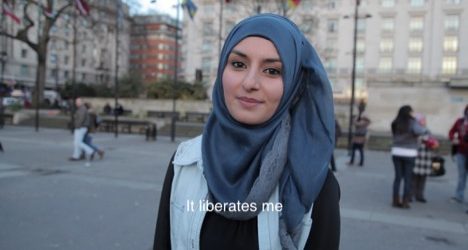
For Muslimah Media Watch:
In the UK, Sadiq Khan, the first Muslim MP for Labour, is campaigning to be the mayor of London. In recent news, comments from an interview with him stated, ‘Questions need to be asked about why Muslim women wear hijabs’. Now at first glance, I thought this must have been quoted wrong. After all, being Muslim, surely Khan knows that for some Muslim women wearing the hijab is a part of their faith? So I continued to read. Comments such as, ‘In London, we got on. People dressed the same,’ made me think that although Khan may be happy to conform to certain sartorial norms to be considered “the same”, others may not. It portrays Khan as almost whitewashing London.
I have yet to visit a part of London where people dress the same. From fashionistas setting their own trends, to the pockets of London where traditional dress from different countries billows on the streets in bright colours in local markets to London’s Brick Lane which calls itself, ‘A microcosm of London’s shifting ethnic patterns’. In fact, in London, you are unlikely to stand out as you may do in other parts of the country which haven’t seen as much ethnic diversity as the Capital. Just because Khan chose to ‘dress the same’ (which is a lot easier for a man than it can be for a Muslim woman who believes that hijab is part of her religious dress code), doesn’t mean that he should be promoting conformity and Britishness in this way. If Khan wants to dress “the same” as the majority that is his prerogative, but that isn’t the case for everyone whose dress, traditions and cultural nuances form a part of their lives and that doesn’t mean they are any less British. In a poll conducted by ICM Research, ‘86% of British Muslims feel a strong sense of belonging in Britain, which is higher than the national average.’ Khan ignores this when he argues that choosing to wear certain clothes is evidence of a lack of belonging: ‘What you see now are people born and raised here who are choosing to wear the jilbab or niqab. There is a question to be asked about what is going on in those homes.’ This statement indicates that something dangerous may be happening if women choose to wear Islamic or cultural dress, which is irresponsible given Khan’s platform to represent British Muslims. It also confuses what I think Khan’s point might be, which is that some women aren’t choosing to wear the hijab and that it can sometimes be imposed on women as a result of societal or family pressures. If this is the case, then it needs to be separated from discourse that lumps all discussions on Islamic dress together.
The critique I offer is about the presentation of Khan’s comments in the article, and the presentation of Khan’s comments simply reinforce the message that British Muslim women who choose to dress a certain way are not ‘British’. It also ignores the alternative narrative of female Muslim women who see wearing the hijab as empowering. It also does not account for women who use Islamic dress as a statement of rebellion. Dressing a certain way has long been used to assert identity or control over parental or societies pressures to conform.
Finish reading the full post at Muslimah Media Watch


April 17, 2016
MEE Feature: A new force rises in the east: Comic Con Dubai

‘Jason’ from the film Friday the 13th and ‘Leatherface’ from Texas Chainsaw Massacre pose with eager fans (MEE/Shereen Malherbe)
Darth Vader greets you in Arabic, a new generation of Middle East superheroes challenge America’s comic book domination, and Marvel’s legendary artist Stan Lee makes an appearance to show his appreciation for his legions of fans.
Welcome to Comic Con Dubai.
With the emirate city state’s World Trade Centre and Burj Khalifa as a backdrop, excitement and anticipation hung in the air as what has been called “the MENA region’s most anticipated pop culture event” kicked off on 7 April.

Dubai’s Comic Con 2016 was bustling with enthusiasts eager to see their favourite characters (MEE/Shereen Malherbe)
Excited children carrying Comic Con goodie bags and people dressed as comic book heroes formed an unusual sight in Dubai’s business district.

‘Spiderman’ – ‘Wolverine’ and ‘Rorschach’ are in character for their fans (MEE/Shereen Malherbe)
Inside the world of Comic Con
Inside, the exhibition hall was dominated by big names: Marvel, MBC2, IMG Worlds of Adventure and Geek Nation. As people bustled between booths and gaming stations, above our heads were screams from a zip wire as would-be superheroes took to the wire and made like Spiderman.
Young children to adults of all ages were wearing their favourite superhero outfits and stocking up on comic memorabilia from fan art to models and original pieces by artists and designers.
The IMAX Cine Club line was roped off with fans lining up eagerly to see sneak previews of movie trailers and the Star Wars Episode VII: The Force Awakens. Scheduled for the evening slot at the Cine club was the event everyone was waiting for; a live broadcast session with Marvel comic book legend Stan Lee.
“Professional” Cosplayers – people who dress up as their favourite comic book characters – are always a popular fixture at Comic Con, and were dotted around the event posing for photographs with the enthusiastic crowds. I met Chun Li, a Philippine national representing Kuwait as a Cosplay competitor – with hopes of winning the top prize of 5000 AED ($1360). But it was not just about the money for Chun Li. “It’s kind of my hobby, it flows in my blood and I just love it,” he said.

A view from one of the main exhibition halls (MEE/Shereen Malherbe)
A Star Wars fan group, the 501st Legion, whose members had visited Comic Con around the world, said that “Dubai’s Comic Con is getting bigger and better every year and there is a lot of love here.”
Galactic Empire leader Darth Vader said farewell with a very Arabic, “Salam,” stopping patiently every time someone asked for a photograph.

The Star Wars fan group ‘501st Legion’ poses with Shereen Malherbe (MEE/Shereen Malherbe)
For more memorable and original photographs, “MBC Meets the Stars” provided the opportunity for fans to get autographs and photographs taken with their favourite celebrities. These included , Christopher Lloyd Nikolaj Coster-Waldau, and Randy Orton.
International Artist
MEE spotted Jonathan Bolerjack, one of the international artists of Comic Con who had spent the last year working for Stan Lee. He told us that he was the “guinea pig” for the first Middle East Comic Con.
When asked how it compared to others, he said, “This convention is better than some I have been to in the States, but I think the more important thing is not how different it is but how the same it is. The fans are exactly the same. That is what I appreciate the most.”

International artist Jonathan Bolerjack was happy to smile for a picture (MEE/Shereen Malherbe)
MEE asked him about how Stan Lee felt about coming to Dubai. “He is a little too old to make the trek but he wanted to.”
The artists formed part of a close-knit community at the event, conversing with each other whilst selling samples of their artworks and making sketches of potential future comic characters, as well as commissioning pieces to sketch there and then to be designed as their very own unique hero.
– See more at: http://www.middleeasteye.net/in-depth/features/comic-con-middle-eastern-flavour-609811494#sthash.rkmC2nkU.dpuf


April 9, 2016
BookFabulous Reviews Jasmine Falling
‘And so begins a tale that is immersed in the history of an uprooted nation, that has seen the larger part of its people forced into fleeing their homes from the terror unleashed on the day Israel declared its state. For those Palestinians who chose to remain behind, the occupation’s incessant humiliations and intimidation continue to be an everyday horror and Jasmine’s father’s family is no exception.
‘Jasmine Falling’ is a multi-layered novel in that it oscillates between the unresolved political narrative related to the Israeli-Palestinian conflict and the mystical, even mythical portrayal that seems tethered to any discourse or even work of literature wherever Jerusalem and Islam are concerned. And thus it is rather no surprise that the author conjures up the Jinn, and speaks of shadows and whisperings as if the place, Palestine, were a living breathing entity, a character holding its own within the structure of the novel, actively involved in the characters’ lives, etching its place into their individual narratives, refusing to be ignored.
From the streets, the gates of the Old City loomed into view. They towered above her with locks clamped on either side of the open doors. A raven squawked from a perch on its walls, the sound splintering through her bones as she entered into the maze. Smoke hissed and escaped the kebab shops, shisha smoke blew from the lips of old men, drawn from decorated glass bulbs… The shops were made of the same mould, cut from ancient stone and formed from the natural concaves in the rock… The place itself felt familiar. It had barely changed in thousands of years despite the wars, crusades and occupations. A feeling of déjà vu crept into her bones, reminding her of the nightmares she used to have all those years ago as a child … ‘Don’t forget your heritage here, Jasmine. Don’t forget the land’s heritage. It is part of you’. Her father’s voice resonated in her head’
What distinctively sets this promising author’s work apart from other recently released, arguably more polished fiction on the same subject is her intelligent choice to include the narrative of ‘the other’. There is a belief many share that literature opens up the world to readers, it allows them to ‘hear’ and ‘see’ and ‘feel’ the different points of view with regards the same event offering multiple perspectives on the world that may not be possible in real life.
As such, the beautifully written letters of ‘Bert’ to his papa – possibly my favourite bits in the book – elevate not only the author’s writing style but also reflect a mature, confident writer behind them who believes in fair play. That said, there is no doubt where this author’s allegiances lie, and what her powerful messages are about; love, hope, resilience, faith and human compassion. Shereen Malherbe is one promising writer who is a definite contender on the scene and one to duly take note of.’
 Jasmine Falling on BookFabulous 2016 Fiction List
Jasmine Falling on BookFabulous 2016 Fiction ListTo read the full review by Rana Asfour, visit the beautiful BookFabulous site.


April 5, 2016
An interview with Filmmaker, Nijla Mu’min

With an accolade of awards and recognition for her screenwriting, including her work in progress film, Jinn which has already received several high ratings on the industry script database, Shereen Malherbe speaks to filmmaker Nijla Mu’min about her new highly anticipated first feature film.
SM: Tells us about your film Jinn in a snapshot.
NM: Jinn is a coming of age dramedy about a carefree black girl whose world is turned upside when her mother converts to Islam, sending her on a quest for self-definition. It’s a fun, fresh exploration of identity, Islam, millennial culture, and first love.
SM: Where do you draw your character’s experiences from?
NM: Some of my character’s experiences are loosely drawn from my experiences growing up, specifically around her introduction to Islam and the complex and multifaceted world she is brought into. Summer’s experiences also mirror mine in relation to identity- I never felt, and still don’t feel, that I fit neatly into one way of being. I am fascinated by the duality and intersections of identity, and how categories don’t fit people.
SM: I agree with that perception that categories don’t fit people. I read a tweet of yours saying ‘if you want to know why i’m making @JinnFilm, here it is. this is how i resist.’ in response to American politics, so was your character Summer written to be representative of America’s current relationship with Islam?
NM: No, I don’t feel Summer is representative of America’s current relationship with Islam, though I do think that her journey and conversion in the story does connect to some people’s own process of learning about Islam in this country. There’s a lot of misinformation and stigma at the moment, so as some audiences go on the journey with Summer, hopefully they come away with the complexity and nuance that she does. But I try not to crafts stories and characters on a macro level. It’s all about specificity in emotion and in growth. In that, people are able to relate and connect.
SM: I think that it is a great point, to focus on specificity in emotion when telling stories.
H ow do you find those emotions and interactions to build ideas for your films?
NM: It’s about taking every opportunity to observe and document the life and people around me, which influence my art and filmmaking. Stories come to me on the subway, looking into the eyes of strangers at a bodega, or in observing a wordless exchange on the street. I also keep a journal and write things down to remember them. I also love photography and poetry so I work with these images and build a world around them.
SM: How important is it to be out and about involved in your community?
NM: I think it’s really important to be in the world, and engage with others in the world. Whether that’s through walking down the street without headphones on and no cell phone, or going to a screening or a dance performance and letting someone’s movement impact your soul, or smiling at someone because you felt their spirit. Human interaction is necessary to break down some of the barriers we face every day. The more we can take in one another, the more we can be human to one another.
To read the full interview visit Muslimah Media Watch


April 2, 2016
On the BelAhdan Show
My appearance on the BelAhdan Show with Ahmed Tharwat, I discuss how my visit to Palestine inspired me to write my debut novel, Jasmine Falling.


March 12, 2016
Diversity & Books: Reading, Publishing & Telling More Stories

‘At the start of 2016, The Guardian reported a ‘survey of workforce at 34 book publishers and eight review journals in [the] US reveals 79% of staff are white’. It isn’t a surprise that bookstores around the UK tend to reflect this lack of diversity, with few non-dominant narratives or books by people of colour, making their way onto our shelves. At the same time, a survey by London Short Story Festival, argues that ‘By 2051, one in five people in the UK, is predicted to be from an ethnic minority’.
Are things beginning to change with a greater focus on diversity in books? Recently I have witnessed an unprecedented amount of focus on mainstream publishers and literary agents in their attempts to reach out to BAME (a term generally used in the UK to represent Black, Asian and Minority Ethnic) authors. Popular social media campaigns began with Naomi Frisby & Dan Lipscombe’s #DiverseDecember#ReadDiverse2016. Last week, we saw the introduction of major publisher Simon & Schuster announcing the imprint Salaam Reads for Muslim children’s books. We have also just witnessed the launch of the Bare Lit Festival, a much-needed global platform, hosted in London, for celebrating talent among BAME writers. One of the initiatives of Media Diversified (the organisers behind Bare Lit & other projects) is to increase the diversity within the publishing industry since, ‘BAME people are under-represented in the media industry by a magnitude of over 300%.’
This all has personal resonance for me. I began writing my novel, Jasmine Falling a few years ago. My novel follows the journey of Jasmine; a British/Palestinian girl, who travels to Palestine in search of her missing father. I spent the last two years marketing it to the UK publishing industry. I have had a rollercoaster ride of anticipation, from rejections to full manuscript requests and promises of a contract. What became clear was an emerging pattern of responses mostly summarizing their inability to target or understand my market. A personal favourite of mine was when a response from a literary agent landed on my doormat explaining that ‘the Palestinian background [of my novel] jars with the chick-lit character.’ Did that mean my character was incapable of experiencing the same emotions as any other woman because of her heritage? I am not saying that is the sole reason my book wasn’t taken on by a UK agent or publisher. There are of course many factors that inhibit the entry of all writers, but surely the lack of diversity in the industry can’t help.’
To read more, visit Muslimah Media Watch


March 5, 2016
Sisters Magazine Reviews Jasmine Falling



Excerpt
‘Jasmine Falling is also a rich Middle Eastern tale that makes us fall for a land ripped between war and other social ills. The beauty and the richness of the land are still present no matter what it went through and still goes through as shows through the pages that Malherbe penned so well. In the end, we realise that this story is also a folklore tale of love, hope, redemption, loss, and unwavering faith.
If stories of Palestine and Israel fascinate you, Jasmine Falling is definitely for you. Also, if the spirits (the unseen) of this world are something that intrigue you, don’t hesitate to give this story a chance as they have their explanations and roots in all the Abrahamic religions.’
For the full review visit, Sisters Magazine.



![Pageflex Persona [document: PRS0000026_00018]](https://i.gr-assets.com/images/S/compressed.photo.goodreads.com/hostedimages/1460292378i/18722999._SY540_.jpg)
